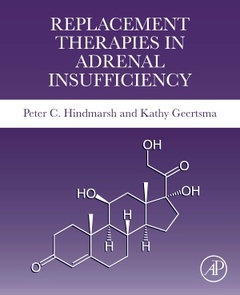Replacement Therapies in Adrenal Insufficiency
Auteurs : Hindmarsh Peter C., Geertsma Kathy

2. Mortality and morbidity data
3. Side effects and survey results of quality of life
4. Oral Glucocorticoid replacement
5. What is dosing regimen
6. How to calculate daily dose
7. How to distribute the dose
8. Drug interactions including drugs that alter liver metabolism
9. Specific problems with hormone replacement – oral or transdermal estrogens
10. Interplay of cortisol and vasopressin – diagnosis of diabetes insipidus and DDAVP replacement
11. Pituitary replacement that may modify hydrocortisone dosing – thyroxine and growth hormone
12. Monitoring replacement
13. What’s missing what are we replacing what should we check
14. Ways of checking 17OHP, ACTH cortisol
15. Single sample versus multiple samples
16. Around dose sampling
17. Effects of OCP
18. Adjusting doses for events
19. Illness and the boxes
20. Stressful events
21. Surgery
22. Dental and the boxes
23. Travel and time zones
24. Adjustments and effects on other hormones e.g. DDAVP
25. Glucocorticoid replacement using pump therapy
26. Pump therapy to mimic circadian rhythm
27. Principles of the pump
28. Setting the system up, clearance studies
29. Monitoring replacement
30. Quality of life
31. Managing an Adrenal Crisis
32. Presentation as new diagnosis or following diagnosis
33. What it is and what it is not
34. Biochemical changes
35. How to manage a crisis - at home, in A&E after admission
36. Hydrocortisone requirements in a crisis
37. Glucose requirements during a crisis
38. Sodium and fluid balance - the importance of subacute or chronic hyponatraemia
39. Hyperkalaemia
40. Weaning Glucocorticoids
41. Factors influencing adrenal suppression dose, type of steroid, how long given, potency and whether given during day or night
42. The role of alternate day treatments
43. Principles in weaning
44. How to wean depending on duration of exposure, disease activity steroid used
45. What tests to use to determine axis recovery
As the parent of a young adult with Salt Wasting Congenital Adrenal Hyperplasia, Kathy Geertsma became Chair of the Congenital Adrenal Hyperplasia Parent and Support Group. She has extensive contact with parents and patients from all over the world who struggle with confirming a CAH diagnosis and getting proper treatment. As a result, she offers a unique perspective about how practitioners can better serve the needs of their patient population.
- Provides available treatment means and how to apply them in varying situations, including use among the chronically ill and within emergency settings
- Includes "Clinical Messages" within each chapter that provide clinical applications for the latest research in each discipline area, with a specific disease focus
- Outlines practical points in the management of adrenal insufficiency, including daily maintenance therapy, illness, sick days, emergencies and travel
Date de parution : 03-2024
Ouvrage de 490 p.
21.5x27.6 cm
Thème de Replacement Therapies in Adrenal Insufficiency :
Mots-clés :
24 hour cortisol profile; adrenal autoantibodies; Adrenal cortex; adrenal hypoplasia congenita; Adrenal insufficiency; adrenal medulla; adrenal rests; adrenal steroidogenesis; Adrenal suppression; basal rates; Bioavailability; bioavailability; bolus function; Bone density; cerebral oedema; cholesterol; Circadian rhythm; circadian rhythm; Clearance; congenital adrenal hyperplasia; cortisol; Cortisol binding globulin; cortisol profiles; Cortisol-cortisone shuttle; DDAVP; DEXA; dexamethasone suppression test; diabetes insipidus; Disorders of the adrenal glands; Disorders of the hypothalamus and pituitary gland; double dose; Fludrocortisone; glucocorticoid; glucocorticoid receptor; glucocorticoids; haematocrit; half-life; half-maximal inhibitory concentration; Hydrocortisone; hyponatraemia; hypopituitarism; Insulin induced hypoglycaemia test; Metabolic Syndrome; mineralocorticoid; More@4 AM; osmosis; osmotic demyelination syndrome; osteopenia; osteoporosis



